|
23 West Street
Erith
01322 348097
https://whatpub.com/running-horses
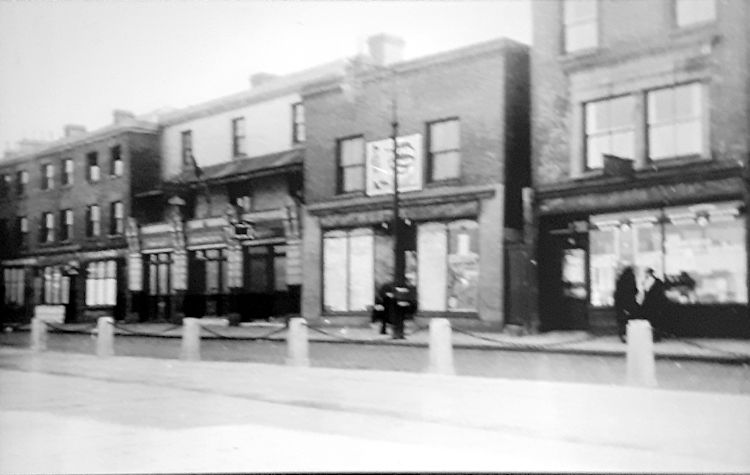
Above photo, 1935, showing the original building. |
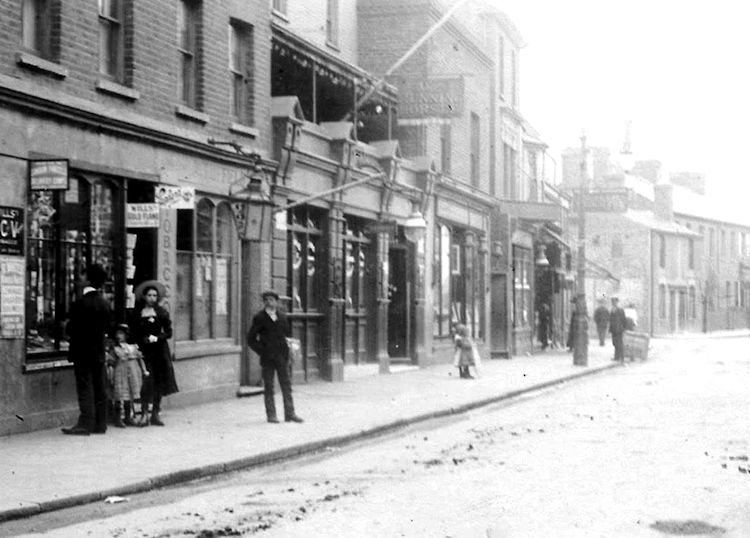
Above photo circa 1930s. |
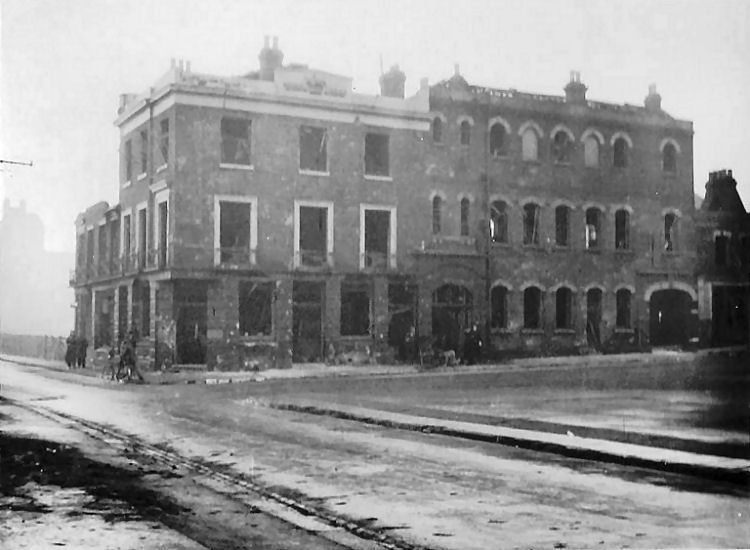
Above photo date unknown, showing the High Street junction with Cross
Street, the "Running Horses" would have been to the right of this
picture. Kindly submitted by Peter Maine. |
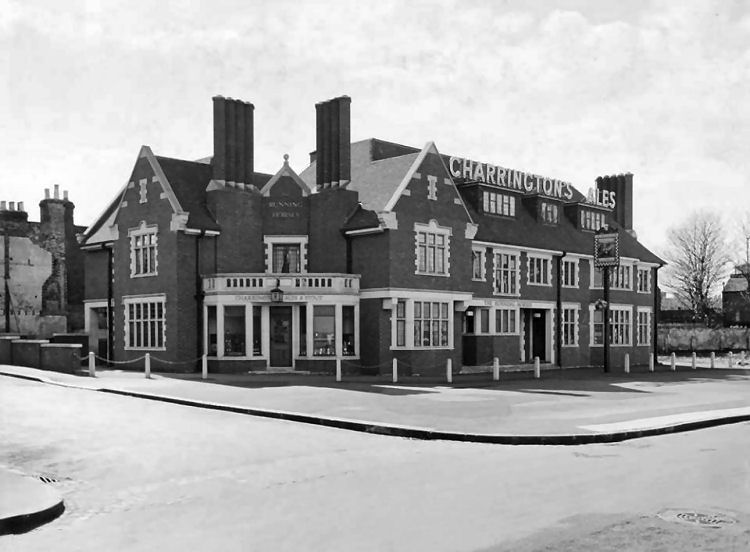
Above photo 1939. |
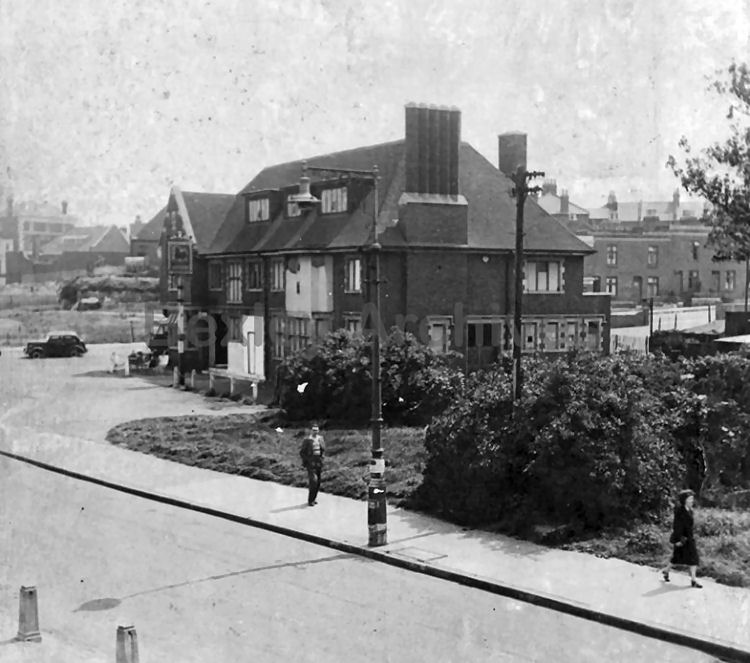
Above photo, 1940, taken from Bexley Archives. |
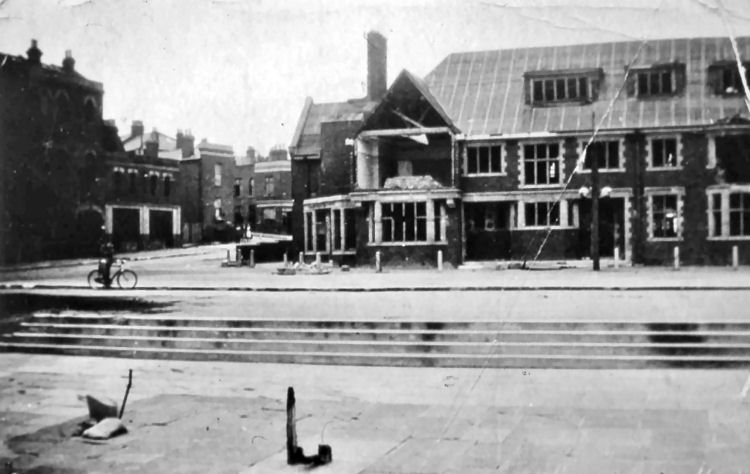
Above photo showing the damage the pub suffered from a bomb in 1940
prior to demolition. The "Crown" is on
the left of this picture. |
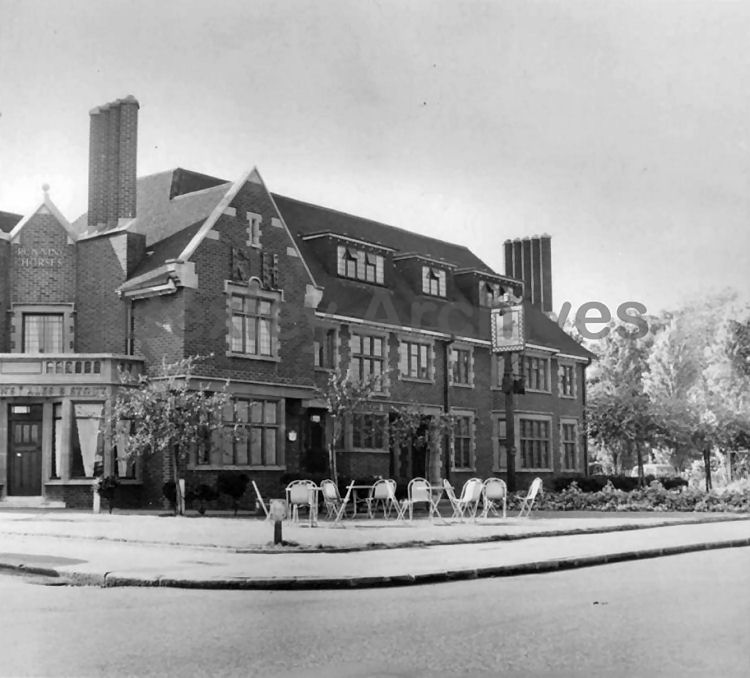
Above photo, date unknown, taken from Bexley Archives. |
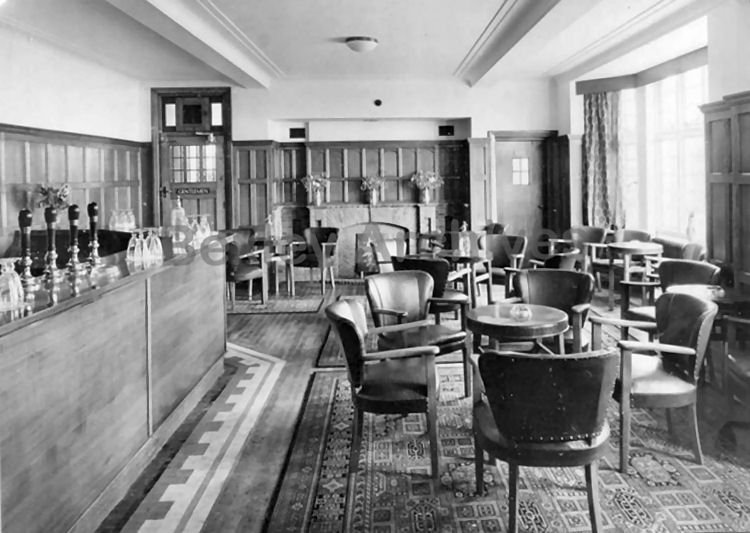
Above photo, date unknown, taken from Bexley Archives. |
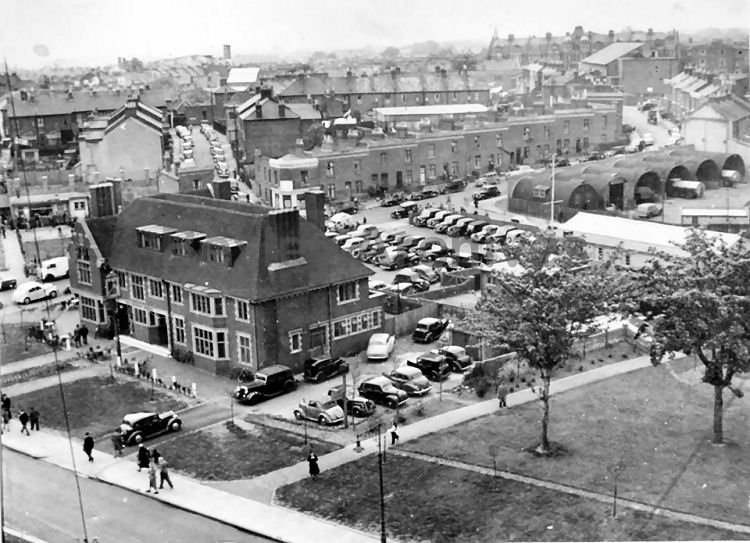
Above photo, 1950s, taken from Bexley Archives. |
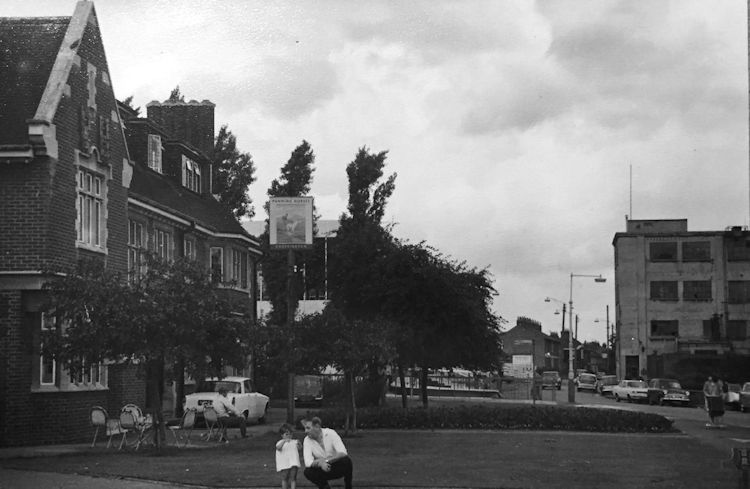
Above photo, 1968. |
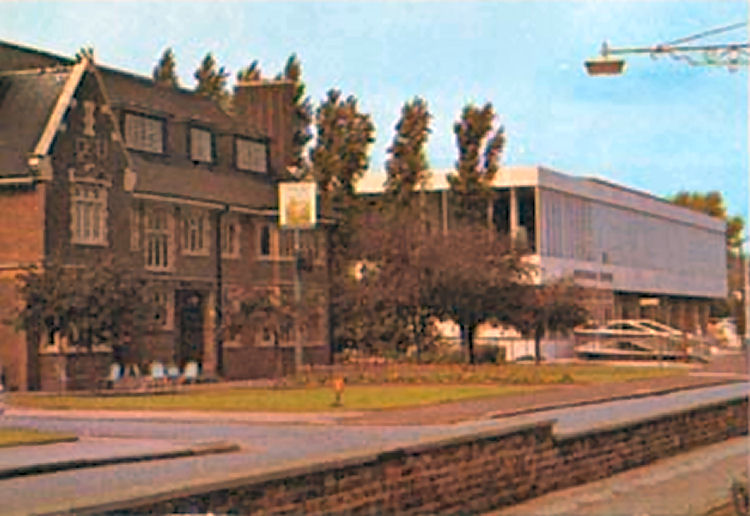
Above postcard, 1970. |
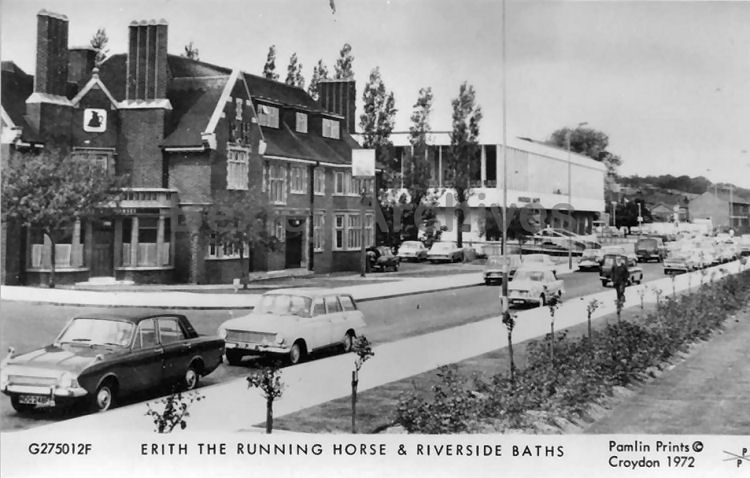
Above postcard, 1972, taken from Bexley Archives. |
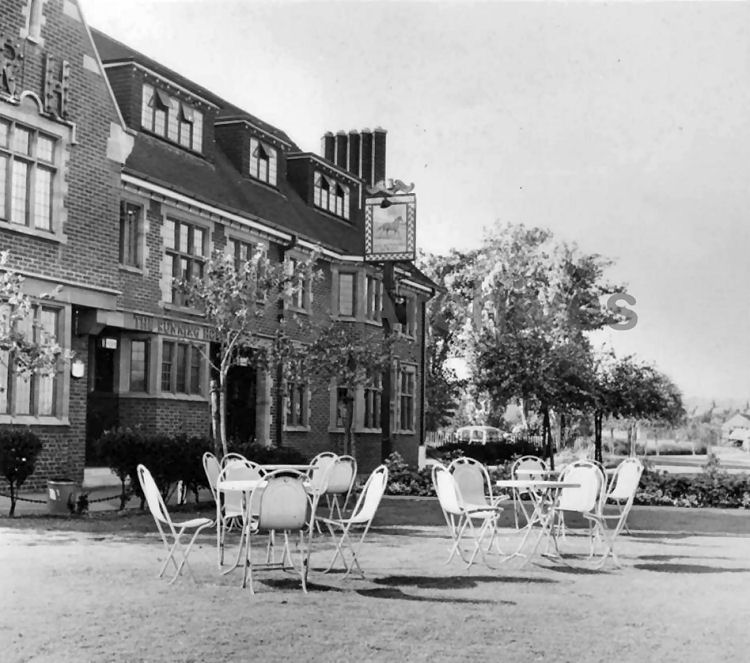
Above photo, date unknown, taken from
Bexley Archives. |
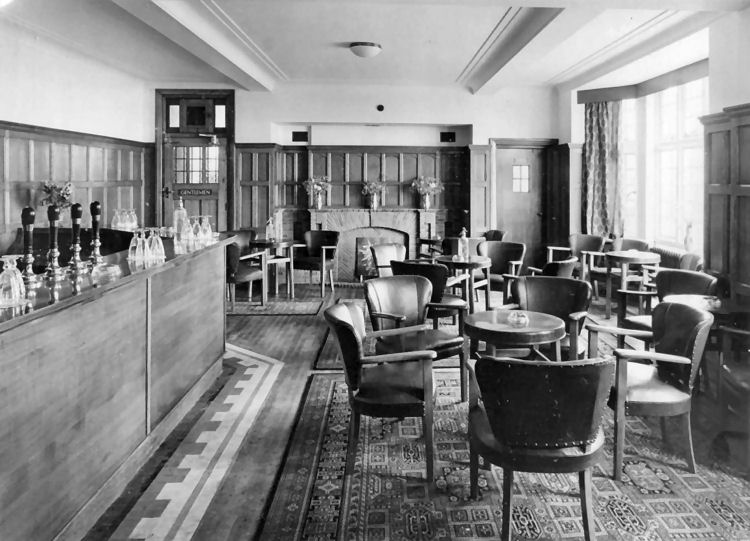
Above photo, date unknown, from the
Bexley Archives. |
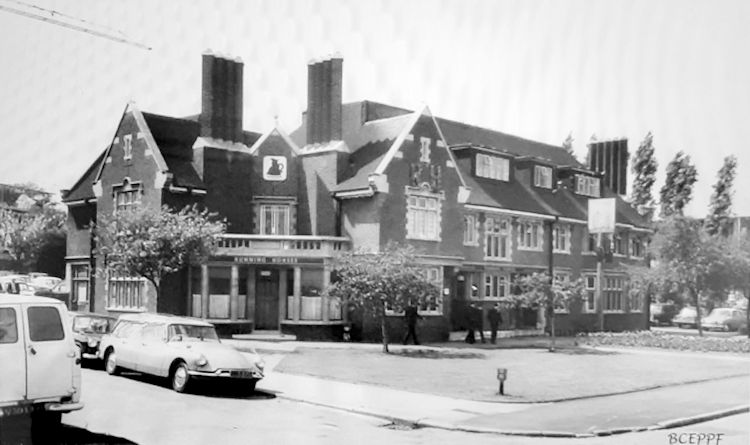
Above photo, 1986. |
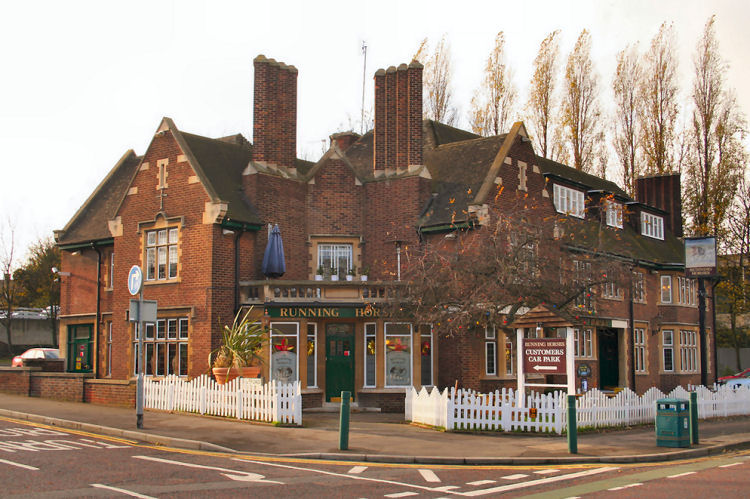
Above photo 2006 by Dave Patten
Creative Commons Licence. |
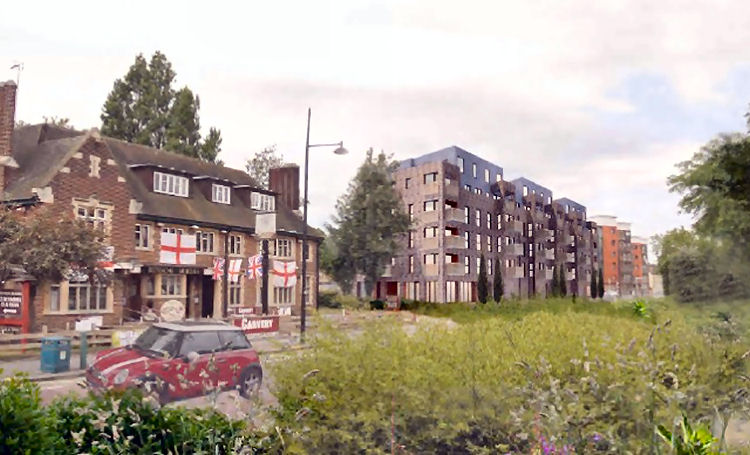
Above photo 2015. |
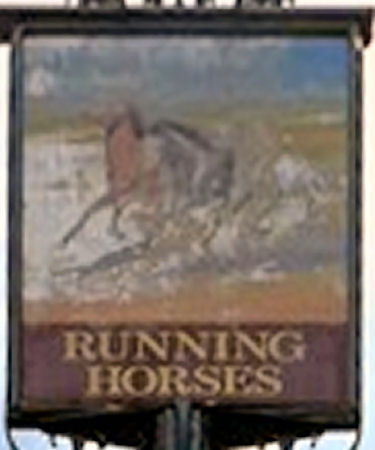 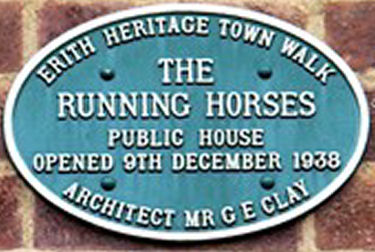
Above sign 2011, and plate on the right. |
The "Running Horses" recalls the wild horses that once roamed through the
Erith marshes.
A new build was opened in December 1938 after demolition of the original,
which remodelled the style of the High Street. This building was damaged by
bombing at 7.30 on the evening of the 29th of November, 1940, the landlord
Zacheria Cole was killed whilst standing in the doorway. The bomb having
fallen on what is now Riverside gardens. A temporary building was erected
whilst repairs took place and the pub re-opened in 1946.
|
West Kent Guardian, Saturday 4 January 1840.
Another inquest was held on Monday, at the "Running Horses," Erith, on
the body of a man unknown, found in the river Thames. A person appeared
to identify the body, but a letter was found in the hat of the deceased,
signed William Belcher, and dated November 26th, from H.M. steamer
Monkey, off Woolwich, and directed to his wife, at Mr. Hoopers, the
Vine, Portsea, stating that he had arrived at Woolwich and would return
in 6 or 8 days, and that, in the meantime, he would endeavour to find
out his sister at Deptford. In consequence of this the inquest was
adjourned for further enquiries; but upon the jury meeting again on
Thursday, it appeared that the Monkey was paid off immediately on her
arrival at Woolwich, and that no clue could be obtained for ascertaining
whether the deceased belonged to her or not, or who he was.
The jury returned a verdict, "Found Drowned."
|
|
From the Borough of Greenwich Free Press, 21 February, 1857.
TRANSFER OF LICENCES, Feb. 16. GREENWICH.
(Before T. Lewin, Esq., Chairman; Major Gosset Mr. Alderman
Eagleton, and J. Sutton, Esq.
Erith.
"Running Horse," Jane Maria Newman to John Pryer.
|
|
From the Kentish Chronicle and General Advertiser, 20 July, 1861. Price 1 1/2d.
SINGULAR DISCOVERY OF TREASURE AT ERITH.
A few days since a party of seven men were employed in grubbing up
several decayed trees on the estate of Capt Wheatly, at Erith, when they
discovered a bar of metal some feet below the surface, and completely
embedded in the roots of an old oak. The bar was taken to the “Running
Horse Tavern,” when it was discovered to be solid silver, value about
£125 and bearing date 1532. As it appears that the lord of the manor
declined to claim the property, the finders took it to a bullion dealer in London, who offered to
purchase the bar provided that the consent of the Treasury was first
obtained. A statement of the case was then forwarded to the Lords or the
Treasury, from whom an answer was received to the effect that no claim
would be made on the part of the crown, and the property has, therefore,
been sold, and the amount shared amongst thy fortunate finders of the
treasure.
|
|
Maidstone Telegraph, 24 October 1868.
INQUEST.
On Wednesday afternoon, C. J. Cattar, Esq., coroner for West Kent,
resumed the enquiry at the "Running Horses," Erith, as to the cause of
death of Arthur Turner, the young man found on the 24th ult., on the
railway line against Plough Bridge. The enquiry had been adjourned in
order that the deceased's employer should be present. George Austin,
labourer, Leasness Heath, deposed to finding the body on the up line at
6.50 a.m., on the 25th ult. There was blood on the bridge, and deceased
lay 13 or 14 yards from the bridge. His head was very much mutilated.
Mr. James Thomas Sainsbury, auctioneer, of Blackfriars Road, London in
whose service deceased was within a few days of his death, was next
examined. The Coroner asked how it was he did not attend on the last
occasion. The jury did not think it a very creditable procedure on his
(the witness's) part. Witness replied that he did not see what use he
could have been. The Coroner said that for the sake of common humanity
he should have shown some little kindness and attention to the matter;
and not delayed coming because (as he, the Coroner, was informed) his
railway fare was not prepaid. Witness:- I don't know what I have to do
in the matter at all.
The Coroner told witness the importance of the jury being acquainted
with what he (the witness) knew in the matter. Such conduct always gave
rise to suspicion; and the inference drawn was that there was something
behindhand which he (witness) did not want to know. Witness then deposed
to having employed deceased for about six weeks in 1866, giving him 10s
a week and a commission. He again entered his service in August this
year, and remained with witness till the Monday before his death. On
that day witness sent him to the post-office for 5s worth of stamps to
stamp a number of circulars. Deceased told witness there were 59
circulars. he told deceased not to post them, but to let him see them
first. Subsequently deceased told witness he had posted them, and then
his (witness's) suspicions were aroused, and he went to the post-office
to make enquiries as to the number. He ascertained that the number
posted was 38. He accused deceased of dishonesty, and he admitted the
wrong he had done. Witness then threatened to give him into custody if
he did not at once go, and he left the premises.
By the Jury:- Deceased was paid about 18s on the Saturday previous. The
Coroner remarked that that was very important evidence, and if witness
had not attended that day he (the coroner) would have issued a warrant
for his apprehension.
The jury returned a verdict that deceased died from the injuries he
received, but how those injuries were caused there was no evidence to
show.
|
|
Maidstone Telegraph 18 February 1871.
DARTFORD PETTY SESSIONS. - SATURDAY FEB. 11.
James Bridge, of the "Running Horse," Erith, was summoned for keeping
his house open for the sale of excisables during prohibited hours the
29th January last. Fined 20s. and costs.
|
|
Taunton Courier, and Western Advertiser, Wednesday 24 May 1871.
The Eltham Murder.
The following extraordinary statement in reference to this
mysterious case has been made to the police. The author of it called
upon Mr. Pook, the accused's solicitor, on Monday evening, and was
immediately taken by that gentleman before the police inspector, at
the Blackheath Road station, who took the statement down. It has
been sent to the Treasury.
The statement is as follows:- "I, John Hutton, of the "Clarence
Hotel," Jeffreys Road, Clapham, and of the "Bull Inn," Birchwood
corner, St. Mary Cray, Kent, say:- On Thursday afternoon last I was
at my house, the "Bull Inn," Birchwood corner, when Mr. Bridge,
of
the "Running Horses," Erith, called upon me with reference to the
purchase of a tent which I have the sale. In the course of
conversation the subject of the Eltham murder was mentioned, and Mr.
Bridge turned around, and in the most energetic manner said, "So
help me God, they have not got the right man. Pook is not the man',
nor "the murderer," I cannot say which. I said, "What are you
saying? Be careful; and he replied, "So help me, God, I know the
murderer." I said, "Bridge, you are not doing your duty to the
public;" adding, "Are you waiting till Pook is discharged and the
reward is offered by the government?" Bridge then said, "I have told
the police, but they did not take much notice of it." I then asked
him who he believed was the murderer, and he said, "I know him, and
I could pick him out of a thousand. He is a soldier," and with great
force repeated the words "I can pick him out of a thousand." Some
other conversation then followed, but I do not remember the words,
after which Mr. Bridge said, "The soldier came to my house on the
night of the murder, between 11.30 and 12 o'clock, without hat or
cap. Blood was on his hands and clothes, and I took him into the
kitchen and assisted to wash him. I do not recollect Mr. Bridge
saying anything more."
|
|
Bexley Heath and Bexley Observer, Saturday 21 April 1877.
Robbing a Dwarf.
On Monday, at Woolwich, Mary Ann Jukes, 35, laundress, no home, was
charged with stealing as 5 1/2d from the pocket of John Frederick
Baldwin.
Prosecutor, a diminutive little man whose head could just be seen
over the witness box, said that he went into the "Running Horses"
public house, Erith, on Saturday to sell some goods which he was
hawking, when prisoner asked him to pay for some beer, and because
he refused she lifted him onto the table and took his money out of
his pocket. Prisoner then "took her hook" out of the house, but came
back shortly afterwards and was then given into custody. His money
was not found.
Prisoner denied the charge, saying that she nearly lifted the
prosecutor up for a lark, because he was more like a boy.
Sergeant Collis said that a witness came to the station on Saturday
night, and said that he had seen the prisoner take the money from
the prosecutor, but it was not present to day.
Mr. Balguy reminded the prisoner till Wednesday, telling the
sergeant to try and get the witness on that day.
On Wednesday, C. T. Brown, a working man of Erith, said the prisoner
called for a pint of beer and saying to the prosecutor, "I should
like to take you to Woolwich," lifted him on a stool, and put her
hand in his pocket. The prosecutor was half drunk at the time.
Sergeant Collis said the prisoner had been in custody for
drunkenness.
Prisoner asserted her innocence, and Mr. Balguy remarking that he
had a doubt about the case, discharged her.
|
|
Grantham Journal 10 August 1907.
COLLAPSE OF A FLOOR.
An extraordinary and alarming accident occurred at the "Running Horse
Inn," in Erith, on Saturday night, during the progress of a concert
following a quoit match. The concert was taking place in a large room
over the public-house bars, and there was about sixty people present.
Suddenly, without the slightest warning, the whole floor collapsed, and
fell in, with the members of the audience, into the bars beneath, which
at the time was filled with customers. Loud shrieks were raised, and for
some time the scene was one of the utmost confusion and consternation,
but only a few people were injured.
|
|
From pubhistory.com accessed 27 Nov 2015.
My Grandfather, Thomas Arthur House (b. 12/11/1896, Westminster) was killed at The "Running
Horses" at 1930 hrs on 29/11/1940 during a bombing raid. He was an ARP
Ambulance Driver, aged 44 yrs. He was killed with a Henry George
Frederick Parry, aged 19 yrs, an ARP Stretcher Bearer and an Albert
Sydney Humphreys, aged 50 yrs, a Fireman, AFS. They are commemorated in
perpetuity by The Commonwealth War Graves Commission. The licensee of
the pub, William Zachariah Coles, aged 49 yrs, was also killed in the
blast.
I have been told that the "Crown"
public House, which stood on the opposite corner to the "Running
Horses," was so severely damaged it was never used again and was later
demolished. The landlord's wife, Mary Louisa Witherdon, aged 73 yrs was
also killed along with a Joseph Lancelot Addison, aged 76 yrs. A local
researcher remembers his father telling him "the Crown had got it" when
he returned home from fire watching. Mr. Coles had been standing at the
front door of the newly completed "Running Horses" and was killed
instantly. Apart from the deaths of my Grandfather and his colleagues
there were no less than twenty people injured. One of the wardens, a
Henry Sims was slightly injured and reported that the victims in the pub
were still seated at the table and had no visible injuries, they were
typical blast victims. The landlord's wife, Annie Elizabeth Coles is
understood to have continued to serve drinks out of the back of the pub
after her husband was killed.
My Grandfather's widow, Flora McAlister Campbell House (McGregor)
went on to marry Leslie James Holloway (16/05/1916 Erith d. Jul 1989
Dartford) Dec 1942. He became the landlord of the "Kings
Head" public house in Erith and lived there for 42 years having
moved there at the age of two. The pub used to belong to his uncle,
Arthur Hewett, who lived next door. He had a club foot and used a crutch
to get around the bar. Because of his uncle's disability, the pub was
run by his parents, James William Holloway (b. Dec 1885 Dartford) and
Emma Matilda Holloway (Hewett). Les remembered beer being 4d a pint and
tobacco fourpence ha'penny a packet. He was a popular figure in Erith
having run the "Kings Head" for over
10 yrs. He was once described as Erith's answer to Fanny Waldren - the
famous Tottenham Hotspurs winger of the 1920's.
Graham R A Jansen.
|
|
From the
https://www.msn.com Story by Emily Davison 20 March 2023.
Dartford man commissions war memorial grave for grandfather he never knew.
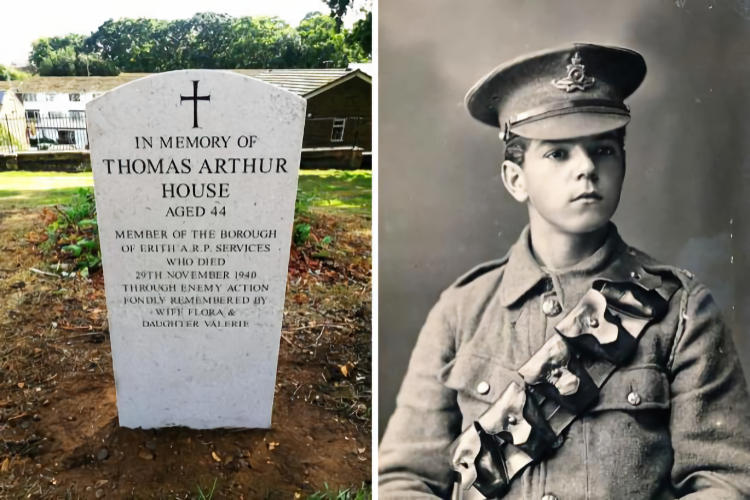
A man from Dartford has fulfilled his promise to his late mother to
install a war grave in memory of her father Thomas Arthur House who was
killed in the line of duty in 1940. (Image: Graham Jansen)
A man from Dartford has fulfilled his promise to his late mum to
commission a headstone for her adoptive dad, his grandfather, who was a
local hero who died in service as an ambulance driver during WWII.
Last year Graham Jansen began researching the life of Thomas Arthur
House, who adopted his mum at the age of two.
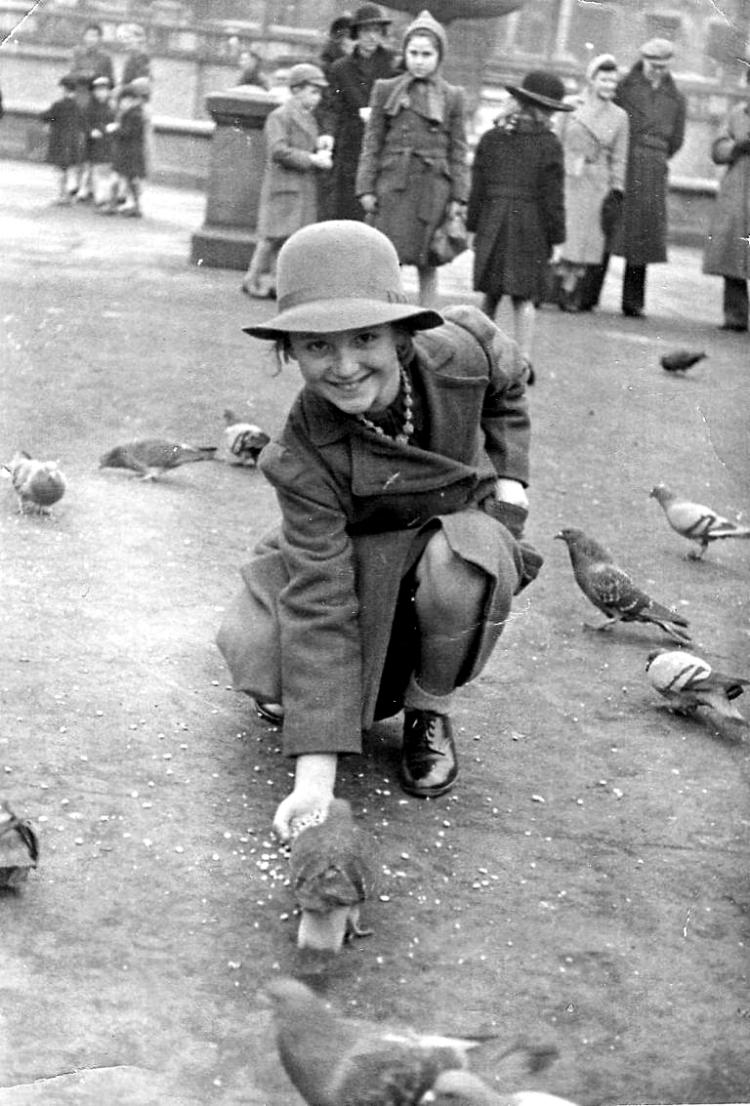
Graham's mother Valerie as a child at Trafalgar Square. (Image: Graham
Jansen)
He was an ARP ambulance driver who was killed aged 44 in service on
November 29, 1940 during an air raid that hit the Running Horses pub in
Erith where he had been called to that night.
According to Graham’s findings, records from Bexleyheath Library
revealed that Thomas was responding to a bombing incident in the area.
Graham’s mum Valerie Jeanette Smith, who passed away in October 2021,
was adopted by Thomas and his wife at age two in 1938.
Graham told the News Shopper that Valerie knew Thomas for two years
before being evacuated to Devon during the outbreak of WWII.
He said his mum “never truly” recovered upon hearing the news of his
tragic death.
Graham said: “My mum had very, very fond memories of Thomas for the
short time she knew him.
“His death was quite a traumatic time of her life, because she was only
a young girl at the time of his death and it had a big impact on her.
“Whenever she spoke of him, she used to get quite tearful, but she
always referred to him as Daddy.
“She was still referring to him as Daddy even when she was in her early
80s.
“So, I think there was a very strong bond there that my mother always
remembered.”
The bombing raid that killed Thomas at the Running Horses also garnered
national attention when it was featured on a recent episode of DNA
Journey on ITV.
The episode featured celebrity appearances from Alan Carr and Amanda
Holden who visited the Erith pub.
Despite being killed in the line of duty, Thomas never had a war grave
to commemorate his sacrifice during the war.
According to Graham, Thomas would have been “entitled” to receive a
Commonwealth War Grave provided by Bexley Council.
However, Thomas’ wife Flora decided against it for fear that Thomas
would not have wanted vital war funds spent on one.
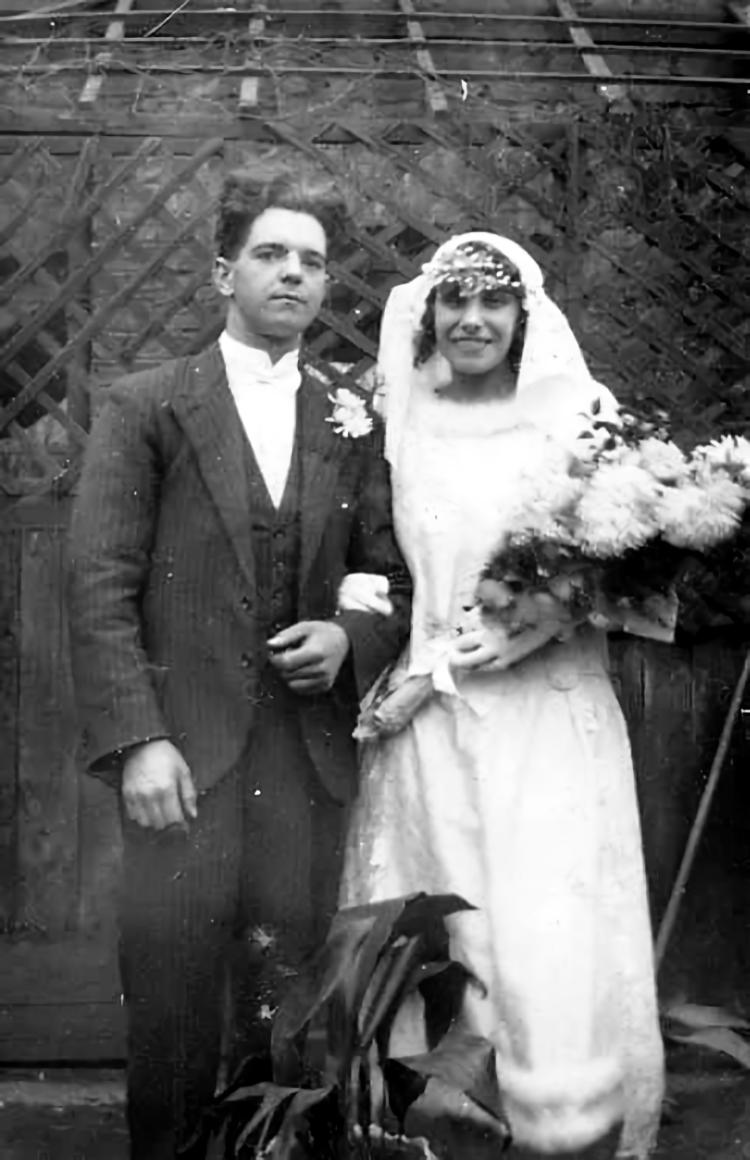
News Shopper: Thomas Arthur House's wedding. (Image: Graham Jansen)
Graham said: “My mum always said that my grandmother decided that he
wouldn't have wanted essential funds being wasted at that time for a war
grave.
‘So, for all these years he just had an unmarked grave.”
Until last year, Thomas’ final resting place in Erith Cemetery was
marked with an unmarked grave.
However, Graham made it his mission to change that and self-funded a
headstone that was installed in September 2022, a year after the death
of his mother.
Graham said: “I felt it was fitting he should have a proper headstone as
a local hero rather than an unmarked grave.”
“The grave now stands proudly in Erith Cemetery just as I promised my
mum it would.
“It now stands as a lasting memory to her and to Thomas.
“It’s important to educate people so they know and understand. And
especially for younger children, they can get some appreciation of what
the older generation went through.” |
LICENSEE LIST
KEMPTON Sarah 1828+

NEWMAN Thomas 1832-51+ (age 60 in 1851 ) )

NEWMAN Jane Maria to 16/Feb/1857
 PRYER John 16/Feb/1857-62+ (age 45 in 1861
PRYER John 16/Feb/1857-62+ (age 45 in 1861 ) )
BEAVER Robert John to Aug/1867
FLEMING Joseph Staples Aug/1867+
THORPE William John 1870+
BRIDGE James 1871-Dec/74 dec'd (age 40 in 1871 ) )
BRIDGE Harriet Feb/1875+
SKINNER Alfred Aug/1880+
FISHER Mary Mrs 1881-82+ (age 31 in 1881 ) )
ELEY Frederick Cecil June/1886+
HENSHAW James Henry Dec/1887-91+ (age 33 in 1891 ) )
CLARKE William Mar/1894+
BREWER Charles John 8/Jan/1895+
HILLIER William 10/Apr/1902-03+

BLYTH William Frederick 26/Jan/1904+
 COLES Samuel 23/May/1907-20/Nov/11
COLES Samuel 23/May/1907-20/Nov/11

MONTAGUE James Frank 1913+
WILLIAMS Arthur E 1922+
GRANT George 1930+
BUTLER James Frederick 1938+
COLES William Zachariah 1939-29/Nov/40 (age 48 in 1939)
COLES Annie Elizabeth 29/Nov/1940+
https://pubwiki.co.uk/RunningHorses.shtml
 From the Pigot's Directory 1828-29 From the Pigot's Directory 1828-29
 From the Pigot's Directory 1832-33-34 From the Pigot's Directory 1832-33-34
 Census Census
 From the Kelly's Directory 1903 From the Kelly's Directory 1903
|





















